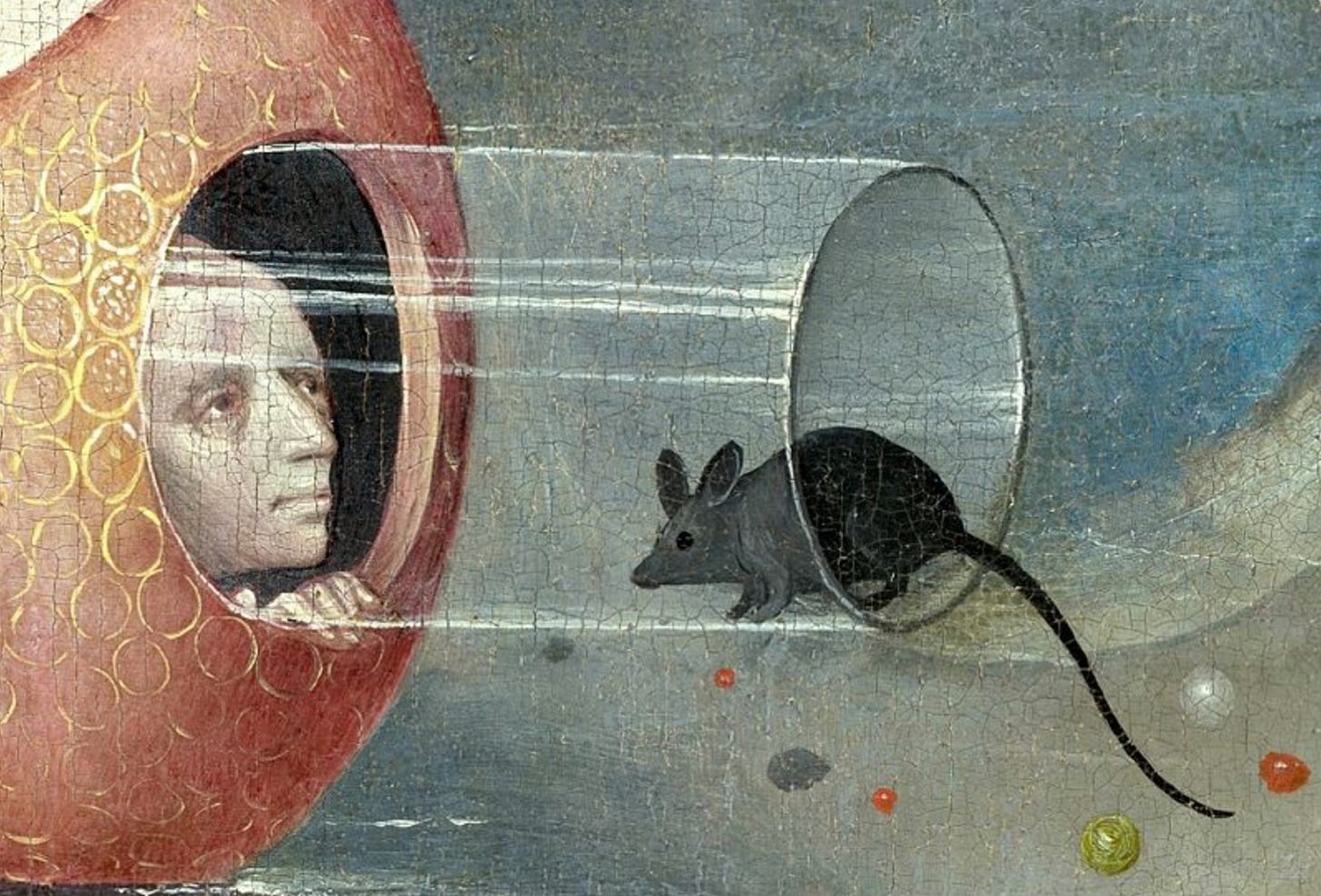Self-doubt: Taming the Rat
You've decided to write a novel. You've got an idea you like, an idea that seems to have resonance. So you make a plan, and get to work. Things seem to be going OK, and then, a little way up the road, production slows. Then it grinds to a halt. Any of the following might be going through your mind:
I thought I had the next Gone Girl. Then I spotted the massive plot-hole.
Most novels are 100,000 words or more. I'm struggling with the first 500.
I've just re-read it, and honestly, I'm embarrassed.
Do I really want to spend the little free time I have on my own? For the next two years?
That sex scene. Everyone I know will read it, and they won't be able to look at me without thinking of me doing that thing. And worse, that other thing.
I look in the mirror and I don't see an author. I see me.
Who the hell am I to think that people will want to read what I write? How arrogant is that?
Self-doubt is a rat. It gnaws at you. But the good news is that the rat can be tamed, and when you have done so, you will understand that the rat is good. It is your drill sergeant, your interrogator. It will fuck with your head every way it can, and if you let it, it will talk you into giving up. But remember this: the ultimate aim of the rat is that you succeed, because the rat is you, just as the writer is you.
So how do we reconcile the two? How do we tame the rat?
Here's my advice:
Don't commit to a single idea too early. Keep a minimum of three different ideas in play, and switch between them. Each idea should have a file (physical or digital), in which you keep ideas, names, images, sounds, screenshots, maps, photos grabbed from the TV, wiki-pages, jokes, snatches of dialogue, lists of reference books, anything that could conceivably come in useful. Keep a phone by the bed for late-night notes (if you think you'll remember it tomorrow morning, trust me: you won't. There's a good chance you won't even remember that you had the idea at all).
Multiple files/ideas are good because you can move between them. Dedicate a train journey to one idea, and the journey home to another. Realise that there are times when you want to concentrate on emotional stuff (what did he feel, exactly, when he saw that she'd taken off her wedding ring), and others when you're more in the mood for a puzzle (how can she leave the country without money or a passport), fact-checking (how long does a full blood-transfusion take), dialogue-wrangling, or action.
It's much easier and more enjoyable to accumulate story-ingredients like this, on an as-and-when basis, than to work to a rigid template. The fact that you've got several ideas on the go means that if one of them goes belly-up for whatever reason, you're not wiped out. You've got others to move forward with. There's a very good chance that some of the elements from the now-defunct project can be repurposed, either straight away or in the future.
Investment in a single idea is fine if you're 100% certain that it's 'the one', but if it flames out for whatever reason (someone else got there first), then you're left with nothing except to start again from scratch. And that's tough. So hedge your bets. Have other stuff going on. This advice is partly practical, but it's also psychological. If you've invested in a single idea, and it crashes and burns, that impacts on confidence and self-esteem. Remember that you are the guardian of your psyche, your inner life. It's your resource, your instrument. So care for it and keep it tuned, like a cello or a dancer's body, because no one else will.
When you're ready, and one of your ideas simply won't let you go, tell people close to you that you're planning to write whatever it is that you're planning to write. It's tempting not to, and it's your choice, but beware of the insidious voice that says: if I keep it a secret, no one will know if I give up. That's the rat talking.
If you've built up that folder of ideas, images, half-written scenes etcetera, this is the moment you'll appreciate it. You'll be looking at a series of staging posts, rather than a hundred miles of empty road. If you suddenly and for no obvious reason feel your idea draining of significance - and this happens - you will have a stack of material to tell you that this lurching pessimism is just the rat, back on its bullshit.
Writing is not an indulgence. It's a serious undertaking that others should respect. A challenge which demands a major time-commitment. It's worth doing for its own sake, rather than for any profit or status spike. Do it for you. That's enough. Make your story the place you look forward to losing yourself in. The place where you don't notice the time.
Those first 500 words. The first 5000. They're not going to be easy. Accept this. Know that you're feeling your way, searching for the right tone, the right voice. Think of the infinite care a builder takes to establish a building's foundations. The spirit levels, the plumblines, the string lines. If the foundations are wrong, nothing built on them will be right.
As you begin to move forward, you're like a long-distance runner, trying to find your pace, your breathing rhythm, your calm, rat-free place. You need a runner or a climber's strategic, psyche-protecting thinking. Your immediate task is to reach the next bend, not the finish. The next pitch, not the summit. And back to the psyche - do something every day, even if it's only working on a single sentence. Keep in tune. Keep thinking about your story. Keep going.
There will be bad days. Don't panic. Don't listen to the rat. Instead, be methodical. When you hit a problem, take it out of the house. Walk. You are an embodied being, and all of you - your blood, your limbs, your brain - will be engaged in the problem-solving process. Take the troublesome issue and gameplay it. Turn it inside out, and see what happens. Don't agonise, enjoy the knowledge that you're at full stretch. As alive psychically as you are physically.
When you hit a complex issue (plot, character, whatever), break the problem down into a series of single questions (how does she react now, what did he want then). Trying to resolve multi-stranded questions all at once (what's this relationship all about, anyway) can tie us in knots. It paralyses us, because we instinctively resist tearing down what we've built. By taking a problem a bit at a time, we allow ourselves more leeway. We're much more likely to take imaginative chances if we know we're not risking the whole thing coming apart in our hands.
So enjoy the process. Writing fiction is an adventure. It will change you. Persist, and you'll find yourself writing those magic, longed for words:
THE END
More soon - Luke




Thank you. Truly. That was so helpful, and shockingly familiar, it actually brought me to tears.
Thanks for that. I always work that way now... 3 projects on the go. I don't take classes anymore because I've been told working that way is avoiding commitment to a single project, or flitting too much from one idea to another. Not true! I just wish I had the knowledge of working this wayat the start of my attempts at writing to have tne courage to do what felt right for me. Yes I love the files with all those part scenes in and triggered ideas. They are a goldmine for the flat days and switching to write an emotion you ready to tackle that day means you always work. Still have the rat whispering about sex scenes though 8-)